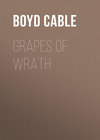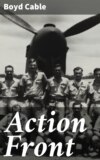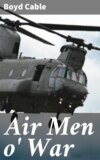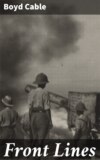Loe raamatut: «By Blow and Kiss», lehekülg 9
CHAPTER XII
Scottie found enough to keep Ned Gunliffe busy about the place for the next day or two, although all the other men were kept hard at work on the hills amongst the sheep.
He saw a good deal of Ess one way and another, and Ess had an uneasy feeling that he was making chances of speaking to her more than she thought right. She was half inclined to speak to her uncle about it, but a girl shrinks from talking of these things to a man. Men are so dense at times, and inclined to want something more tangible to go on than an inflection of a voice or a sidelong look, although these perhaps speak plainer than words to a woman.
But Ned Gunliffe soon removed any chance of doubt of his feelings. He met Ess after the men had gone to the hills, and there was no one about the place but Blazes, and he asked her point-blank if she would walk over the Ridge with him, as he had something to say.
“Won’t it keep, Ned?” she asked brightly, but with an inward qualm of premonition. She called all the men by their Christian names, on Scottie’s advice. It was obviously ridiculous to speak to “Mr. Blazes” and “Mr. Whip” or even “Mr. Thompson,” and she could not use the Mr. to one without using it to all. “I’m rather busy this morning. I have to – a lot of things to do.”
“I won’t keep you ten minutes,” he said eagerly. “Just stroll across to the edge of the Ridge with me. It’s something rather important.”
After that she could not very well refuse without being downright rude, she decided, so she turned to walk with him with a quiet “Very well, Ned.”
They walked in silence to the edge of the Ridge, where it ran down into the valley below, and stood there a moment looking along it and out across the dusty plains shining in the sun.
She tried to stop him speaking after his first few words, but he begged her to let him finish, and went on to pour an impassioned love speech on her troubled ears.
“Stop, stop, please, Ned,” said Ess, when at last he allowed her to speak. “I don’t want to listen to you. It isn’t right for me to, for I can never feel for you in any degree that way. I cannot be any other than a friend.”
“A friend,” he said scornfully. “The same as Whip Thompson, and Darby the Bull, and Blazes, and the rest are your friends. I want more than that, Ess. I want you. I want – ”
She stopped him again with a gesture.
“I can hear nothing more,” she said, with quiet dignity. “You must take my word as final. There can never be anything more between us than there is now.”
“Is there no hope for me?” he said. “I don’t want to press you now, Ess, but perhaps later – ”
“There is no hope,” she said, with an air of finality. “Now, or ever.”
He was silent a moment, fiddling nervously with a button on his coat. She moved as if to turn back, but he stopped her, and burst out suddenly “You’ve given me no reason… Is it – will you tell me if there is anyone else?”
“I think that is more than you have any right to ask,” she said steadily; “but perhaps…” She stopped and thought again with a troubled mind. She felt she would have told him openly that she was pledged to Steve Knight, and that would have settled the thing for good; but Steve had said to say nothing, and her uncle had agreed that it was wiser not to.
“I can only tell you that there is a man I care for more than for any other,” she said at last; “and you must be content with that.”
“Is it Steve Knight?” he shot at her.
She turned without making any answer.
“You can never be held to any word – if there is any word between you – to a man who is an outlaw, and running from the police,” he said hotly.
“That,” she said sharply, “is entirely my own affair. I have mentioned no names, and if you wish to keep any spark of friendship between us, you will let the matter drop now, once and for ever. I have said all that I mean to say.”
She walked back to the yard, Ned Gunliffe striding beside her with a sullen face, but saying nothing more.
She was upset and a good deal afraid that night when she told Scottie something of what had passed, and saw how it disturbed him.
“I wish Steve’s name could have been held out o’ ’t,” he said gruffly. “I dinna just trust that same Ned Gunliffe, and if he thocht it was Steve that was atween you an’ him, an’ he had a chance tae pit Steve oot o’ the road, I’m thinkin’ there wad be a word passed whar it wad dae the maist damage tae the lad.”
“But what could I have done – what can I do now?” she cried, in distress. “Oh, if any harm came to Steve through me it would kill me.”
“Hoot, toot, lassie,” said Scottie, soothingly. “Dinna pit yersel’ aboot. Like enough, Steve is far enough awa’ by this time. His horse has been gone this two days back.”
She worried more than ever about Steve that night, and a talk with Aleck Gault gave her no comfort.
“I can’t tell you anything about him,” said Aleck; “I haven’t seen him since the last time I told you. I can’t go to him, for I’m afraid of being watched there, and of him being found. But he’s all right, never fear. His horse was left where he knows to look for it, and likely enough he’s miles away by now. And you know the trackers are taken off the hills. There’s no fear but what Steve can outwit any white police trooper.”
But Ess, uneasy as she was, would have been doubly so if she had been able to see Ned Gunliffe’s movements that night.
He had caught his horse, and quietly left the Ridge between the fall of dark and the rise of the moon, and now in the bright moonlight he was pressing on over the hills as fast as the rough ground would let him. He went straight and without drawing rein to the spot where Steve and Aleck had met that night – where they had killed the dingo pups – and he halted and dismounted, and searched the ground where they had sat and talked.
He picked up a burnt match, with triumph written on his face. “I couldn’t see their corroboree together,” he muttered, “but I saw them far enough to guess just where they met evidently. Now what is the likeliest spot for him to have gone to hide from here?” He stood and gnawed his underlip in uncertainty for a moment. “He hasn’t gone yet, that’s clear,” he said again. “His horse is still there, so…”
With an impatient oath he turned to his horse and mounted again. “I’ll try the Scoop first. That’s near here, and he could light a fire there without it being seen.”
He rode as near the Scoop as he thought safe, and then left his horse tied to a bush and reconnoitred on foot.
There was nobody in the Scoop; half-a-dozen sheep were foraging there for the scanty herbage, and he knew they would not be there if a man were. The moon was down again by now, and it was a long way back to the Ridge, and he reluctantly turned his horse’s head and abandoned his search for the night.
He was making his way to the hill track between the township and the Ridge, when suddenly his eye caught a quick flash of light on a hillside on his right front.
He pulled up short and sat staring, but there was no further gleam. He thought intently for a moment, and then a look of exultation flashed over his face.
“The old dogger’s hut,” he said triumphantly. “He’s there for a thousand. It hasn’t been used for years back, and it’s so near the township he’d hardly be searched for there. But I must make sure and hurry up about it – it’ll be coming light soon.”
He rode on a few hundred yards with the greatest caution, tied his horse, and set himself to scramble up the hill. It was a stiff climb, and there was light enough to see the dim outlines of the hut when he came to a little spur just below it. He halted and rested there, watching the door which faced him, and when he saw it open he dropped flat and peered close. What he saw brought keen disappointment to him but this quickly gave way to a savage joy, and then, as all the possibilities of his discovery came home to him, he gave a long chuckle of satisfaction.
The door had opened, and a woman – he could see distinctly enough even in the half light that it was a woman, though he could not distinguish who – had stepped out. Then a man had appeared in the doorway, and Ned heard the woman say lightly, “Good night, Steve.”
“Good night – or rather good morning,” came the answer in Steve’s voice.
“See you again to-night – take care of yourself till then,” the woman said, and, with a wave of her hand and flutter of skirts, she was gone round the corner of the hut and into the track that led back towards the township.
“So-ho,” said Ned, softly, as the door closed again. “At the old game again, my bold Fly-by-Night. And that’s what you’re hanging on round here for, when you might be down to the coast and safety by this time. It’s like you to be risking your neck in a noose for the sake of some fool of a woman. Comes up and stays the nights with him evidently. ‘See you again to-night,’ eh? Well, I’ll see if I can’t fix it that you see someone else to-night, and that they see you.”
He slid gently back from his post of observation till he was safe out of sight, and then turned and ran for his horse, and rode his hardest for the Ridge. The heap of stones had been removed from the Axe-Cut, and he was able to get back early enough for breakfast, and to get in without attracting undue attention, although he noticed Aleck Gault look at him sharply as he sauntered in.
Ned Gunliffe turned over several plans in his mind, but the one he decided on called first for an interview with Ess, and it was not till after tea-time that he was able to make the first move in the game. Some of the men came in for the meal, but before sunset went back to the hills to round up the sheep and watch them for the night. Even Scottie had gone off on a round of inspection, and nobody was left about the place except Blazes, Ned Gunliffe, and Darby the Bull. Just before tea a saddle-weary trooper had ridden in and had a meal with the men. Ned Gunliffe left him in conversation with Darby – rather a one-sided conversation it was, as Darby had been warned and re-warned to be careful of what he said to any troopers, and being doubtful of his own abilities in returning answers which would give no information, took the simple plan of giving no answers except Yes and No.
“Roastin’ day to be out in,” said the trooper, affably.
“Yes,” said Darby, cautiously. He had need of his caution. The troopers had discovered that he was the one least skilled in following the trend of their questions, and of understanding the deductions they might draw from his replies. Certainly they had not got much from him up to now, but then at other times there had usually been some of the other men about to relieve Darby of the responsibility of answering questions – a responsibility he had cheerfully left to them. So the trooper eagerly seized on the chance given him by the withdrawal of Ned Gunliffe, the only other man in the hut at the moment beside Darby.
“S’pose,” he said, “you chaps is all as sick as we are o’ bucketing over these hills?”
“Y-e-s,” admitted Darby.
“You know all the country round here well?” asked the trooper.
Darby considered this carefully. “Yes,” he admitted again.
“I dessay now,” he said, looking at Darby with simulated admiration, “a chap like you would know every crack in these hills where a man could stow himself. There’s that place – sort o’ cave – up beyond Split-the-Wind now. Know any more like that?”
Darby shook his head.
The trooper tried another tack. “’Course I’m not on duty now,” he said. “Just dropped in in passin’. I wasn’t sorry to be took off that job. I suppose Steve Knight’s well down to the coast by now. He was makin’ for there, wasn’t he?”
“You go to ’Ell,” said Darby, briskly and cheerfully.
“Well, that’s a nice answer to give a civil question,” said the trooper, indignantly. “D’you s’pose Steve ’imself would talk to a man like that?”
Darby wasn’t quite sure if this came under the heading of a question about Steve. He pondered a moment. It might be so… “You might go to ’Ell,” he said, highly pleased to think of his satisfactory solution of the difficulty. This sort of thing was complicated though, and to stop it he rose and sauntered outside. The trooper walked to the door and sat down where he could keep an eye on him and on Ned Gunliffe, who was talking to Ess at her door.
Ned had seen no sign of Ess when he went out, so he went boldly to the door and knocked.
“I’d just like a word with you, Miss Ess,” he said.
“Yes,” she said doubtfully. “If it’s not about – ”
“It’s not about myself in the first place,” said Ned. “It is about Steve Knight.”
“I have no wish to discuss him,” she said, drawing herself up slightly.
“Neither have I,” he returned. “But I suppose you will admit you are a friend of his, and don’t wish him to come to harm. So,” he added significantly, “you will listen to what I want to say.”
Ess shivered a little at something sinister she fancied she detected in the man’s voice.
“I don’t suppose you know just where Steve is, or why he hasn’t cleared well away by now?” He paused, but as she made no sign of answering, he went on, “I do, and I can tell you both. But before I go further, Miss Ess, I’d like you to understand that I’m not working solely for my own ends in speaking to you about this business. I could have gone straight to the police with my information. I prefer to come to you.”
“Why do you come to me?” she asked, her heart turning cold within her.
“I’ll answer that by asking you a question,” he said. “Would you do anything you could to save him from the police? Anything?”
She groped for his meaning a moment, and began to fancy she could see it, and that he meant to demand herself as the price of his silence.
“I would do anything which I was sure he would wish me to do,” she answered.
“That is hardly the point,” he said, “although I doubt if there is any point he’d stick at your doing to save him.”
“I can’t agree with you,” she said; “but may I ask what all this is leading up to? I’d rather you said plainly what you have to say.”
“Tell me plainly one thing, and I’ll speak straight enough,” he said. “But I won’t unless you satisfy me that there is need for me to prove to you that Steve Knight is a cur and a blackguard.”
That roused her, as he meant it should.
“Steve Knight is more to me than any man will be till I become his wife,” she said hotly. “And so you can understand what I think of a man who uses such words about him – behind his back.”
“I thought so,” he said sadly; “and God knows I’ve no wish to hurt you. But I’m saying nothing about him behind his back I would not say to his face. I’ll do so before the night is over if you like. But, whatever he may be to you, I think I know you well enough to know that when you have heard all I can tell of him you will fling him out of your mind, and that you’ll use worse words to him than I’ve done.”
“This is all rather idle,” she said scornfully. “I am not likely to believe anything you may say against him. You have given me reasons for wishing to lower him in my estimation. You cannot do so.”
“We’ll see,” he said coolly. “I don’t want to hark back and rake up the past records, and the name that Steve Fly-by-Night has here and round about. But perhaps I ought to warn you that although he has many friends, there are none who will deny that his – well, say – inconstancy to his fair ladies is notorious.”
“That may all be,” she said, with white lips; “but that is all past, and if I choose to overlook it, it leaves little room for others to speak.”
“If it were all past – ” said Ned, significantly; then roughly, “See here, Ess, I won’t hint and beat about the bush. I’ve got to speak out, whether you like it or not. Steve Knight is living close to here at this moment, and – he is living with a woman.”
She flinched from him for an instant, but recovered herself. “That,” she said deliberately, “is a lie. And if you think, Ned Gunliffe, you are improving my opinion of you…”
“I’m thinking of nothing of the sort,” he broke in. “And I am doing no more in telling you this for your own sake than any man on Thunder Ridge – than your own uncle – would do. As to it’s being a lie, that is easily proved or disproved. Are you willing for me to prove it?”
“You can’t prove it,” she said shakily. She was sure of Steve, of course, she told herself, but the man seemed so quietly confident. But there might be a mistake somewhere.
“I can prove it,” he returned. “And if you will come with me now – to-night – I will prove it. It will have to be at night, because the woman, whoever she is, leaves him at daybreak to get back to the township, I suppose before she will be noticed.”
She felt weak and sick. She was angry with herself for her doubts, but – her mind went back over the warning her uncle had given her, the half-jesting remarks Steve himself had made – unstable as water – unstable as water. The words rang in her ears. But she would have the proof first, and if it were a lie, she would humble herself, oh so gladly, to Steve for all her doubts.
“Very well, then,” she said, “prove it.”
“You will have to get into your riding things and ride,” he said. “You can trust yourself with me, but if you like, I will give you a pistol to carry, and I’ll ride in front of you all the way.”
She looked at him doubtfully, and wild ideas began to work through her brain.
“If you look at it reasonably,” he said quietly, “you will see that there is nothing to fear from me. I am hardly likely to hurt you. These hills would never hide me if I did. And if I kidnapped you – ” he smiled slightly as her start told him how near the mark of her thoughts his words came, “it is hardly likely to benefit me. But if you are still afraid – there is a trooper over there. We will take him along, although in that case I need hardly warn you that there is likely to be some shooting done, or an arrest made.”
“I’ll come,” she said suddenly, “though I despise myself for my doubts. But I believe you have made some mistake, and it will be a satisfaction to prove it to you as well as myself. Will you promise to let him go free and not divulge his hiding place if you are wrong?”
“Yes,” he said boldly, “I will promise anything if I’m wrong. Dare you promise me as much if I’m right?”
She was silent.
“Ess,” he said earnestly, “believe me I am not only doing this to harm Steve. He could go where he will for me. I’ve no wish to see him again. But it is of you I am thinking. We have all more or less made a jest of Fly-by-Night and his love affairs, or flirtations, or whatever you care to call them. I couldn’t be expected to stand by – especially you knowing what I have told you of my feelings – and see you fooled and made a sport of and a byword in the countryside. None of the men of the Ridge would let him do that and live, and I least of all. And you ought to thank me if I prevent it.”
“I will thank you – if you do that,” she said with shaking lips and voice. “But I’ll curse you, Ned Gunliffe,” she added tensely, “if you’ve made me hate myself for my weak doubts without reason.”
“Be ready in ten minutes,” he said quietly, “and I will show you the reason.”
CHAPTER XIII
Ned Gunliffe walked across the yard to where Darby the Bull was leaning on the rails of the fence, and smoking a contemplative pipe.
“Darby,” said Ned, “I want you to do something for Miss Ess. We want to go for a moonlight canter, and I suppose if that trooper sees us running up the horses or taking a saddle down, he’ll want to interfere. Now do you think you could keep him inside for a few minutes till we get away?”
Darby took the pipe from his mouth and looked at Ned.
“Did ye say Miss Ess wanted to go alone wi’ you?” he asked.
“Yes,” said Ned. “Go and ask her if you like.”
Darby turned without a word and walked across to the house. Ned saw him knock and heard him speak to Ess. Presently he came back and nodded to Ned. “I’ll fix ’im,” he said.
“Just entice him inside for five minutes,” said Ned. “We don’t want any fuss, you know. Say you want to show him something – anything you like, and keep him talking. Look at the clock when you go in, and allow us a good five minutes. Persuade him to stay inside that length of time.”
“Right,” said Darby, and strode off to the bunkhouse.
He found the policeman sitting in the doorway smoking. Darby walked in. “Look ’ere, mate,” he said confidentially, “there’s somethin’ ’ere I want to show you.”
“Hey? What is it?” said the trooper, looking round lazily.
“Can’t you stir your stumps enough to come an’ look?” asked Darby, and after another look at Ned, strolling quietly across the yard, the trooper rose and went inside. He found Darby lighting a match and looking at the clock on the shelf.
“It’s too dark to see much ’ere,” said the trooper, “unless you wants me to see that clock.”
“No, I wants you to see more’n that,” said Darby. “Wait till I light the lamp.” He fumbled with the lamp for some time, and when he had it lit saw with satisfaction that a good minute of his time had already gone. He looked vaguely round the room, and wondered what he was to show.
“Well, what is it?” said the trooper. He glanced suspiciously at the door and took a step towards it.
“Here,” said Darby, sinking his voice to a mysterious pitch. “Come inside; I don’t want anyone to see me show this.” He glanced round the room again, and inspiration came to him. These chaps was always interested in Steve, so —
“D’you know whose bunk that is – was?” he asked, jerking a finger at one of the bunks ranged round the wall.
“Is – was? D’you mean Steve’s?” asked the trooper, with suddenly aroused interest.
Darby restrained himself from uttering the usual formula. He nodded. “That’s what I want to show you,” he said. The trooper approached the bunk curiously. “What about it?” he asked. “See anything in it?” said Darby, hugely pleased with himself. This was simple, he thought. “Blankets,” said the trooper, and ran his hand over them. “Anything else?” said Darby, sitting down and crossing his legs complacently. The minutes were flying steadily. The trooper jerked the blankets off the bunk, and after a look at Darby suddenly hauled the mattress up and ran his hand underneath. He had vague thoughts of finding the weapon which did the deed, or something equally important. He found nothing. “There’s nothing ’ere,” he said, “excep’ blankets an’ mattress.”
“Like to see what’s inside the mattress?” asked Darby, smoothly. The trooper felt it all over. He turned it over and felt it again. He occupied two or three minutes in convincing himself there was nothing there but straw.
“There’s nothin’ in it but straw, far’s I can make out,” he said, with a puzzled look at Darby, sitting there and smiling contentedly at him. “Wot’s the game?”
“Now wot d’you think could be in wi’ straw in a mattress that you couldn’t feel from the outside?” asked Darby. The trooper thought it over. “Papers – a letter?” said the trooper, excitedly. “Papers, or a letter,” agreed Darby, with great satisfaction. He had been vainly racking his brain to think of something to suggest himself. The trooper whipped a knife out and slit the end of the mattress open, and commenced to grope in it. It was well over the five minutes, but Darby watched him, with the greatest interest in what he would suggest next, or do when he found there was nothing. But the trooper suddenly raised his head. He had heard the faint far-off click of a horse’s hoof on a stone. Darby heard it the same moment, and with one stride was beside the trooper.
“Show ’im something, an’ persuade ’im to stay for five minutes,” thought Darby, with a sudden spasm of doubt as to whether that meant five minutes for each item or for both.
“It’s all right,” he said to the trooper. “I just want to persuade you to stop ’ere a minute or two longer.”
But the trooper’s suspicions were thoroughly roused now, and he jumped for the door. Darby caught him by the skirt of his coat in passing and swung him back violently. The trooper’s hand went to his hip, but Darby’s hand went to his and took a grip. And what Darby gripped usually held still. The trooper recognised this, but he made a desperate effort to free himself. Darby twirled him round and threw his arms round him, pinning the trooper’s arms rigidly to his side.
The trooper could use his tongue if he could use nothing else, and he did so with fluency and effect. But Darby held him till a total of ten minutes was gone, and then quietly released him.
The trooper faced him with another burst of language and a heavy revolver pointing in his face. “What – d’you mean?” he demanded.
“It’s orright,” said Darby. “I’ve showed you something, an’ I’ve persuaded you to stay five minutes. It’s orright. You can go now,” and he waved a huge hand towards the open door.
The trooper sprang through it, but was back in a few minutes. “Where’s yer mate gone, blast ye?” he shouted.
“Gone for a moonlight ride wi’ the gal,” said Darby, soothingly. “They’ll be back by’n’bye. You wouldn’t want to go runnin’ after a young couple that way, would you? And besides,” he added, “I dessay Ned shoved the ’orses to the back end o’ the paddock while ’e was at it. But go’n catch yours if you want to. In fac’, I’ll ’elp if you like.”
But the trooper had had enough of Darby’s assistance. “You’ll hear suthin’ more o’ this,” he said viciously. “I suppose you know what you stand to get for interferin’ wi’ a constable in the execution o’ ’is duty.”
“No,” said Darby, with interest. “Tell me. An’ tell me wot was the duty – an’ I didn’t execute you any,” he shouted after the trooper as he hurried out and down in the direction of the horse paddock. “An’, hi you!” he yelled into the darkness, “’adn’t you better come back an’ tidy up that straw you spilt?”
In the meantime Ned and Ess had made good use of the start Darby had given them, and they rode forward in silence at a hard canter. The moon made the track clear to be seen, and Ned Gunliffe rode well in advance. Ess rode with a mind whirling with doubts, anger with Ned and with herself, with fears – fears for herself and for Steve – and, worst of all, with a dreadful and sickening apprehension of what she was going to see.
They rode steadily till they came to the spot from which Ned had first seen the light, and he pulled up there and slid to the ground. “Can you dismount, or shall I help you?” he asked smoothly. Ess was riding across-saddle, and she caught her divided skirt up on the off side and swung neatly to the ground without answering.
He took the reins and tied the two horses to a bush.
“They are up in the old hut a wild-dogger used to live in. It’s empty now, and Steve and the woman are there.”
“So you say,” she said stiffly. “I am here to see.”
“Then follow me, please,” he said. “I need not warn you to move quietly, unless you wish to warn him and give the woman time to slip away. I will go slowly, so that you can keep close.”
He started to clamber over the rocks and up the hill, and, as silently as she could do so, she followed him. The moon was almost down now, and there was barely light to see, and the hill was rough and covered with loose rocks. But Ned Gunliffe moved as quietly as if he were on a grass sward, and moved slowly and patiently to allow the girl to keep up with him without undue noise.
“Wait here and rest a moment and get your breath,” he whispered. “Can you see the hut? And can you see that chink of light? They’re inside.”
They waited while Ess could hear the blood drumming and thundering in her ears. “If a stone rattles or we make any noise,” whispered Ned again, “lie down behind a stone or behind me. He might shoot.” She nodded. She could not have spoken at that moment for her life, and they commenced to move up again, lifting each foot cautiously, and setting it down gently and slowly; and so they came to within a dozen paces of the door. They could clearly see the streak of light shining round the edges of it, and they could hear the low murmur of voices coming from inside the hut.
“You had better speak first,” whispered Ned. “Otherwise he may fling the door wide and shoot, or make a rush. Stand well behind me, and call him and say who you are.”
But Ess felt her courage rising. She had nothing to fear, she told herself. If it were Steve in there, he could explain everything to her. If it were not Steve, and Ned Gunliffe had some plot or purpose of his own which she had not fathomed … she slipped her hand inside her pocket and gripped the butt of a pistol, and half drew it free. Then she raised her voice, and called sharp and clear “Steve – are you there, Steve? This is Ess speaking.”
There was an instant of silence and tense suspense, and almost on the second the streak of light outlining the door winked out. They heard distinctly the thud of bare feet on the floor, as if a man had leaped from a bed or chair, then a hissing whisper, and then a voice. “All right, Ess. Just a minute. Are you alone?”
Her nerves had been singing like tensed wires under the strain of that short moment of silence, and she could have screamed aloud with joy at the relief his voice brought. It was his voice – Steve’s voice – never a doubt of that. She steadied her own and answered, “Only Ned Gunliffe. May I come in?”
“No,” he answered sharply. “Just give me a second, and I’ll be with you.”
A minute later the door opened, and Steve stepped out and closed it behind him. Ess moved from behind Ned and would have run forward, but he put a hand on her arm.
“Ask him who is in the hut there,” he said quietly.
Ess stopped abruptly. She had forgotten everything else for the moment in the joy of seeing Steve there. But Ned had shown no sign, made no sound of surprise or disappointment.
“What is it, Ess? What are you doing here? Is anything wrong?” asked Steve.
“I came to – Ned said – ” she faltered, suddenly burning with shame.
“I brought her,” Ned Gunliffe cut in, “so that she could ask you who is the woman you have in there? Or, if you will let Miss Lincoln satisfy herself that there is no woman, I will apologise to her and to you, and we can go.”
He spoke with something of a sneer, and Steve stooped and peered at him in the dim light.


















